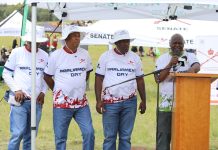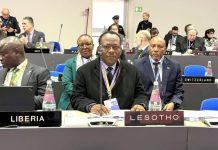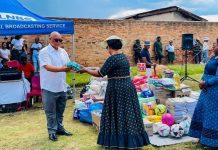Africa-Press – Lesotho. The United Nations Country Team has facilitated a five days training for different stakeholders on the Sustainable Development Goals (SDGs). The United Nations Development Programme (UNDP) Lesotho Deputy Resident Representative:
Nessie Golakai-Gould, speaking on behalf of the UNDP Lesotho Resident Representative, said the training is expected to provide a comprehensive appreciation of the SDGs and the related technical tools for their localization,
implementation, advocacy, coordination, and monitoring. This she said at the launch of the virtual training on SDGs earlier this week. The five days training which commenced on Monday will end on Friday.
The SDGs are the result of the United Nations Conference on Sustainable Development which was held in Rio de Janeiro, Brazil in 2012. These 17 goals replace the
Millennium Development Goals (MDGs) which were born in 2000 to combat the indignity of poverty. According to the UNDP, the SDGs are “unique in that they cover issues that affect us all.
They reaffirm our international commitment to end poverty permanently everywhere. They are ambitious in making sure no one is left behind. More importantly, they involve us all to build a more sustainable, safer, more
prosperous planet for all humanity. ” She highlighted that the Government of Lesotho is working with the UN in implementing a joint program on Economic and Financial Integration for
achieving Sustainable Development (JP – EFMIS) since 2020. Golakai- Gould said the project helps the government to establish a national ecosystem for planning and financing development agenda, to enable realization of its
long-term development vision that includes the SDGs. The training has attracted participation of the representatives from the government, civil society organisations (CSOs), media, private sector and
academia among others. “Within this program UNDP is working with the Ministry of Development Planning to pilot the Integrated National Financing Framework (INFF), aimed at addressing the
impediments for planning and financing for the development of national priorities, UNICEF [United Nations International Children’s Emergency Fund] is supporting strengthening of the public financial management systems, while IOM
[International Organisation for Migration] is supporting mobilization of
remittance flows and diaspora finance for alternative development financing sources. All these are premised on the existence of comprehensive knowledge and
understanding of the Agenda 2030 among key development actors, and domestication. ” “The government alone, may not help the country to a successful implementation and
achievement of the SDGs,” she said. Deputy Resident Representative further challenged the participants to “reflect on how you can make a difference to achieving the national priorities and in reducing
poverty and unemployment, a better Lesotho now and for future generations. As we move towards COP 26 [26th UN Climate Change Conference of the Parties], the issues of environmental degradation and climate change are high
on the global agenda. Lesotho is expected to also be negatively impacted by climate change. In context of the Agenda 2030, achieving inclusive development
and economic growth, should consider integration of all population groups and geographic areas. “I hope this will encourage us to also consider policy actions and strategies to
integrate women and youth, people with disability and rural communities and other marginalized group in the country to ensure that no one is indeed left
behind in development; but also ensure issue of climate mitigation and resilience. ” For his part, the Ministry of Development Planning Principal Secretary (PS) Sello
Tšukulu underscored the concerted efforts from different stakeholders for the realisation of the SDGs. “Sustainable Development requires a cross-sectoral approach to achieve the desired results.
It is therefore important to build capacity of all implementing agencies to stimulate action in areas of critical importance for humanity and the planet to ensure that no-one is left behind.
”
“The United Nations Country Team is supporting the Government of Lesotho in the implementation of SDGs.
In order to achieve positive results, the Government needs to realise that it is critically important to own and lead the process of implementation of SDGs.
Government alone cannot realise this ambitious goals, collective and individual efforts are required at the national and local levels and by all stakeholders such as the Private Sector, Academia, Media and the Civil Society
Organisations for achieving SDGs,” Tšukulu said. He said the government remains committed to implementing Agenda 2030 for Sustainable Development. This agenda he said is aligned and operationalised
through the National Strategic Development Plan (NSDP) II. The PS noted that various activities have been undertaken jointly with the United Nations Country Team towards
implementation of SDGs. He said the assessment of the integration of SDGs into the NSDP II has been completed and “confirms that there is full integration and alignment between
the SDGs and the NSDP II pillars”. Tšukulu however noted that; “The NSDP II midterm review highlights that most of our sectors do not have comprehensive implementation strategies that are linked to
the implementation of SDGs, and this misalignment is also reflected in the national budget. ” “As you are all aware, it is now over five years since the adoption of the SDGs,
yet we are way off target on most of the SDGs. We are faced with limited evidence-based data to inform better planning, comprehensive recovery plans and
timely decision making. ” Commenting on the training, the participants said it will equip them with the tools of trade and enhance their understanding of the SDGs going forward.
For More News And Analysis About Lesotho Follow Africa-Press






